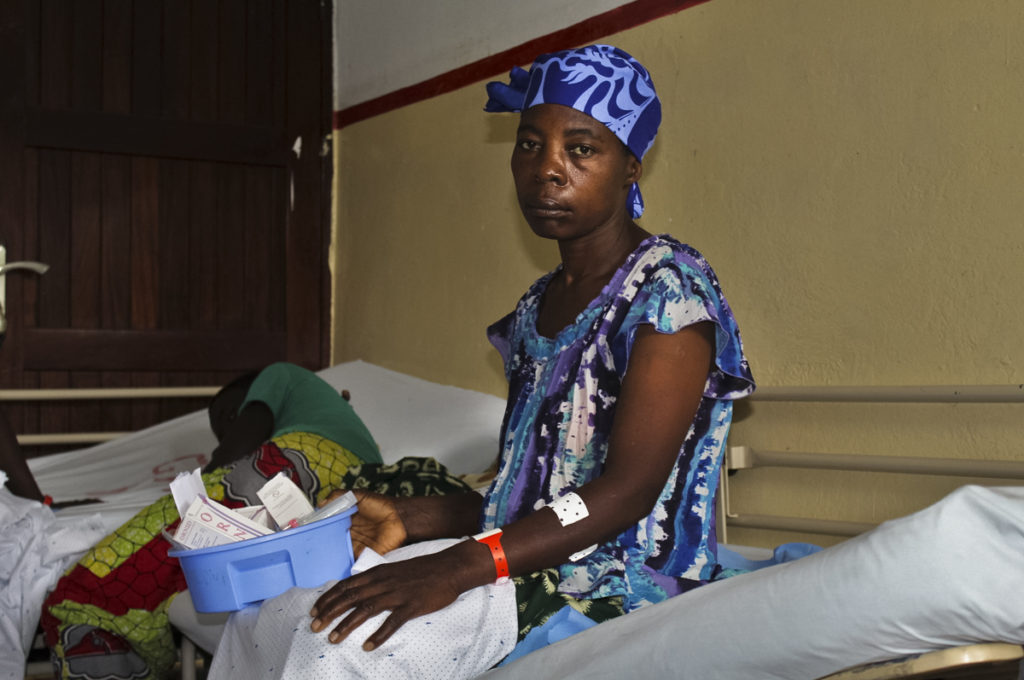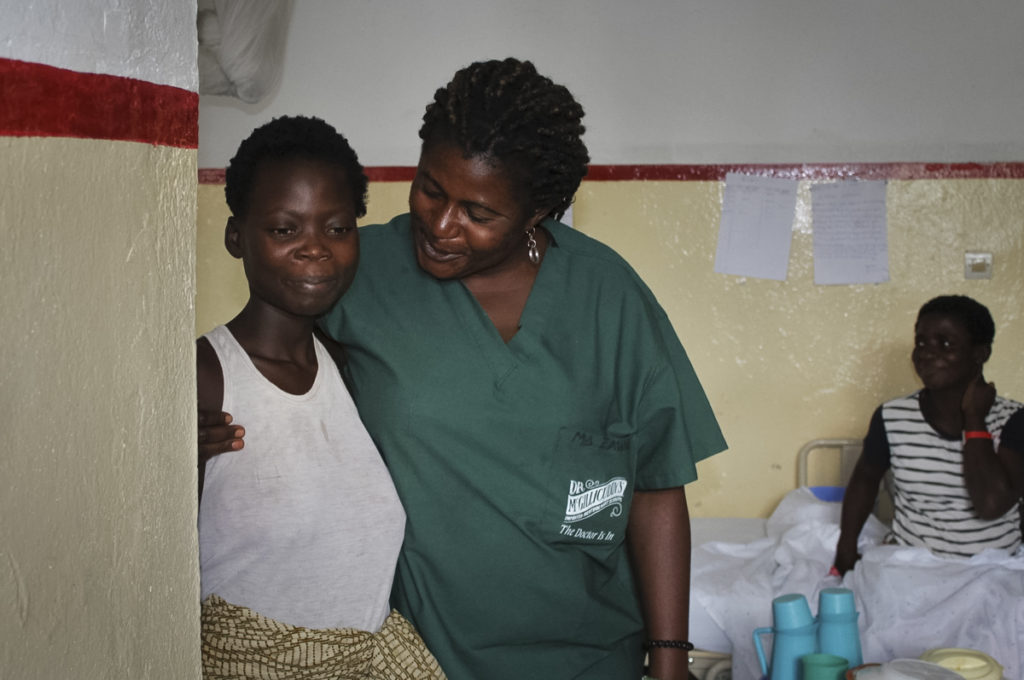
Ley Uwera, GPJ DRC
A child sits near his mother at HEAL Africa, a medical facility that treats women with fistulas. Some women bring their children with them to the hospital. This woman awaits her recovery so she can return to her village and care for her family.
GOMA, DEMOCRATIC REPUBLIC OF CONGO — Chanceline, 22, speaks softly.
Wearing a black T-shirt and a loincloth, she sits on a staircase and appears desperate to avoid attention as she describes the events of January.
Chanceline, who asked that her last name not be revealed, is from Idjwi, an island in Democratic Republic of Congo’s Lake Kivu. Like much of the country, the island is plagued with insecurity. On the day she describes, she was late to collect firewood. That’s a common chore for young women on the island.
“That day, I got caught up in many household chores so I lost track of time,” she says.
When it came time to prepare the evening meal, she realized she hadn’t yet gathered the firewood. It was 6 p.m. by the time she made her way home, with wood on her back.
That’s when a man she describes as sturdy and twice her size appeared, seemingly out of nowhere, and dragged her off the path and into the woods.
He raped her.
“After he finished the act, I tried to get up with excruciating pain and returned home,” she says. “When I reached home, I acted as though nothing ever had happened.”
Chanceline knew other young women who had been raped, and she knew that they were often ostracized by the community.
“I was obliged to do everything possible to make sure that no one ever finds out what had happened to me,” she says.
But Chanceline’s attempts to live a normal life failed when she realized that the rape resulted in pregnancy. She says she thought her life was over. Her hopes of marriage and a happy life in her community were shattered.
As the pregnancy progressed, Chanceline began to feel sharp pains. When she finally visited a health center near the end of her pregnancy, she learned that the fetus had died. After the stillbirth, a clinician referred her to HEAL Africa, a nongovernmental organization that operates a full-service hospital in Goma, capital of DRC’s North Kivu province. There, she learned she had an obstetric fistula – a hole torn in the genital area, which can be caused by prolonged, obstructed labor, early childbearing, surgical trauma, sexual violence or botched abortions.
HEAL Africa is the only health care center in the North Kivu province that offers reconstructive surgery for fistula. Doctors say the problem is an epidemic because rape is a common tool of war here. Women with obstetric fistulas struggle to get the care they need, as road blocks and dangerous conditions in rural areas make safe travel to HEAL Africa a challenge or even impossible.
DRC’s ongoing conflict has caused the collapse of the country’s health care system, according to an article in the African Journal of Emergency Medicine.
It’s estimated that more than 5 million people have died in DRC between 1998 and 2007 due to armed conflicts and the resulting humanitarian crisis, according to the International Rescue Committee. That number is widely accepted by international aid groups, although other estimates vary.
Fistulas cause women to leak urine and stool. The accompanying stench often results in social exclusion. Specific numbers vary, but according to the World Health Organization, an estimated 2 million women in Asia and sub-Saharan Africa live with untreated fistulas.



DRC has one of the world’s highest fertility rates, as well as among the highest infant and maternal mortality rates, according to the World Bank’s World Development Indicators. The Fistula Foundation has given more than $300,000 since 2011 to support fistula treatment at HEAL Africa, one of the only partners to donate money specifically for fistula. That support has made possible more than 1,000 reconstructive surgeries to repair fistulas in DRC.
HEAL Africa and its partners also help women get to its hospital via boat or plane transport, according to Dr. Justin Paluku, a gynecologist at HEAL Africa, who has been treating women with fistula for 15 years. Since January, HEAL Africa has provided transport to Goma for more than 60 women suffering from fistula.
The hospital has a hotline to stay in contact with health centers in DRC’s most remote areas and to learn about and speak with fistula patients, he says.
HEAL Africa treated 2,811 fistula cases between 2006 and 2014, including 173 in 2014, according to the organization’s 2014 annual report. Fistula is prevalent in part because insecurity contributes to rape,Paluku says. But there are other reasons, too.
“Home deliveries are one of the major causes of fistula,” he says.
The primary obstacle to treating fistula is getting women to HEAL Africa.
Women who aren’t treated face extreme daily difficulties.
“Now I smell unpleasant every day and my lower abdomen always itches,” says Mariam Uwimana, a fistula patient at HEAL Africa.
Uwimana says her fistula resulted from a difficult cesarean section at a health clinic in Rutshuru, a village about 70 kilometers (43.5 miles) north of Goma.
The baby was born healthy, but when Uwimana started leaking urine, she says her whole family rejected her.
“My husband abandoned me, he asked me to seek treatment and said that he would come back home after my recovery,” she says. “But he went to live in Uganda. My family members no longer come to my house.”
Even so, Uwimana is one of the lucky ones. She has received fistula reconstructive surgery. Few women are able to seek treatment so soon, says Rehema Bonane, a counselor who works to provide psychological support for women at HEAL Africa.
“Our country has very few doctors and health structures,” Bonane says.
Chanceline, too, received safe transport to HEAL Africa. Now, she is recovering from fistula reconstructive surgery.
She says she is eager to return home to get back to work in the fields with her family.
When she leaves, HEAL Africa will provide her with a reintegration kit that all fistula patients receive. The kit contains clothes, soap and pots.
“Even if people look down on me because of what happened to me, I must return to my home because I really have no other choice,” she says. “Ultimately, getting better is what matters to me.”
Ndayaho Sylvestre, GPJ, translated this article from French.











